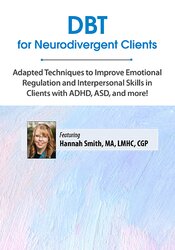
×

Dialectical Behavior Therapy (DBT) has helped thousands of therapists improve their client’s life skills quicker and more effectively than they ever thought possible…
…but if you work with clients who are neurodivergent, you could be missing key ingredients to successfully integrate DBT practices into their lives.
Whether it be talking too fast or not giving enough processing time, using analogies or idioms that don’t work, or even expressing frustrations over client manner of participating, you might unwittingly be perceived as shutting them down or trying to fix them and make them neurotypical rather than equip them to build an abundant life in their own way.
Join neurodiverse speaker and DBT expert Hannah Smith, as she shows you highly effective ways to adapt this powerful treatment for this population and learn how to coach these skills in an accessible & inclusive way.
You’ll gain:
Clients are crying out for skills to help them manage the overwhelm but not so they can “be neurotypical” – and DBT, like no other therapy, includes whole-person/wholebrained skills that can do this.
Register today!
All members of the PESI, Inc. planning committee have provided disclosures of financial relationships with ineligible organizations and any relevant non-financial relationships prior to planning content for this activity. None of the committee members had relevant financial relationships with ineligible companies or other potentially biasing relationships to disclose to learners. For speaker disclosures, please see the faculty biography.
Continuing education credit information is coming soon for this live webcast.

Hannah Smith, MA, LMHC, CGP, an author, business owner, and innovator, is a licensed mental health therapist and internationally board-certified group psychotherapist, consultant & clinical trainer with nearly 25 years of experience in her dual passions: helping others recover from multiple difficult life circumstances and improve their well-being and enhancing the knowledge of clinicians who work in the field of clinical care. With undergraduate degrees in hard sciences and master’s degrees in in special education and counseling psychology, she combines her knowledge in unique ways to analyze and synthesize difficult concept into "feet-to-the-pavement," practical applications for clinical practitioners at all levels. She has done extensive study and work in neuroscience-informed treatment of anxiety and trauma and is certified in interpersonal neurobiology through the Mindsight Institute. Her work experience, both in the US and abroad, has given her a unique perspective, cross-cultural awareness, sensitivity & respect, and a relatability that puts people at ease and makes her highly approachable. Her dynamic and thought-provoking, teaching style is invigorating, making learning fun, personal, and practical.
Speaker Disclosures:
Financial: Hannah Smith maintains a private practice and receives a speaking honorarium from Cascadia Training. She receives royalties as a published author. Hannah Smith receives a speaking honorarium and recording royalties from PESI, Inc. She has no relevant financial relationships with ineligible organizations.
Non-financial: Hannah Smith is a member of the American Group Psychotherapy Association, and the Washington Mental Health Counselors Association.
For live CE credit, you must watch the live webcast in its entirety at its scheduled time and complete the CE quiz and evaluation within one week. You will have access for 90 days after the program for review.
Please note: There will be a 70-minute lunch and two 15-minute breaks; one in the morning and one in the afternoon. Lunch and break times will be announced by the speaker and at their discretion. A more detailed schedule is available upon request.
Visit our FAQ page at https://www.pesicanada.ca/faq or contact us at https://www.pesicanada.ca/contact-us.
Masking, ableism and more: a clinician’s guide to modern neurodivergence concepts
Why neuroscience in DBT for the neurodiverse population – benefits & challenges
The problem of dialectics
Awareness & adaptations in teaching mindfulness: finding the beacon in the storm
Regulating emotions for sensory overload - riding the mighty waves
Neuroscience-informed strategies for distress tolerance & crisis management: from tempest to tranquility
De-mystifying interpersonal effectiveness - “it’s not just social cuing”
Case studies & practical applications
Satisfaction Guarantee
Your satisfaction is our goal and our guarantee. Concerns should be addressed to info@pesicanada.com.
Please wait ...